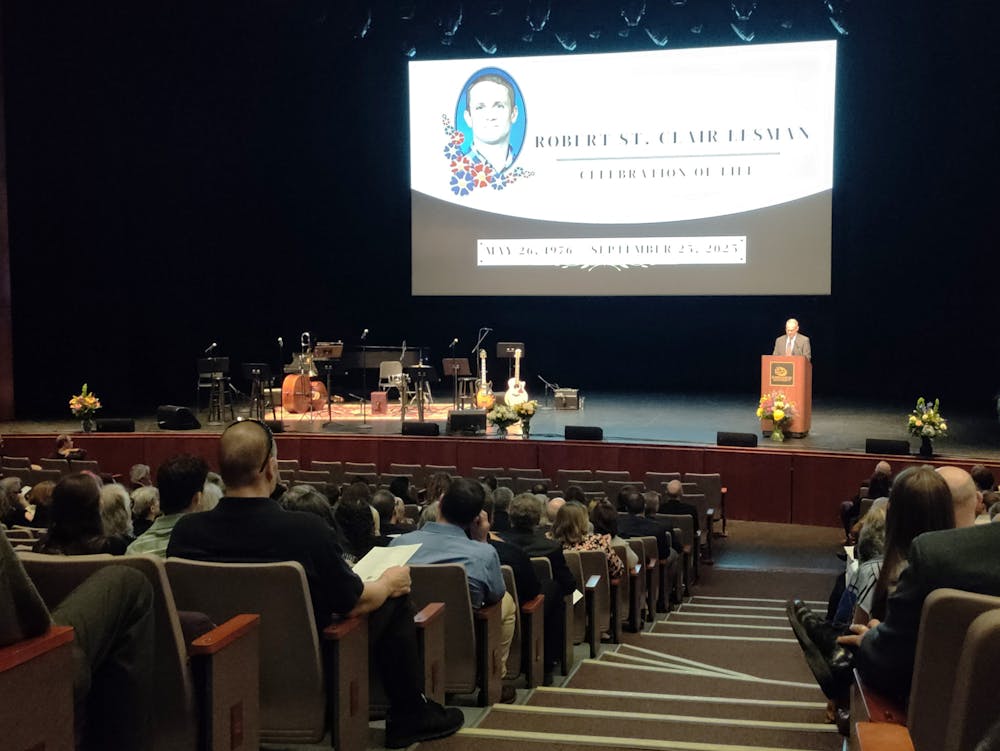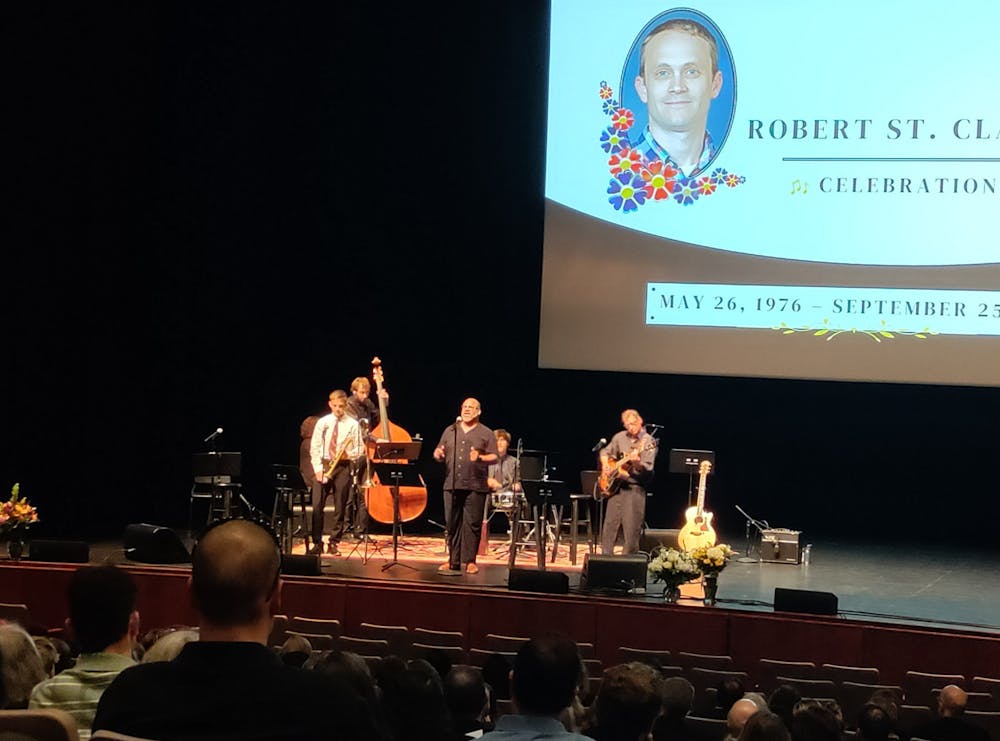Members of the Shippensburg University community were welcomed to a celebration of the life of Professor Robert Lesman in the Luhrs Performing Arts Center on Sunday, Oct. 12.
In attendance was the Lesman family and the many friends of his family. Additionally, rows of seats were filled by faculty and students whose lives Lesman had touched during his 19-year career at Shippensburg University.
Over the course of the memorial, speakers recounted cherished memories of Lesman and reflected on what lessons he taught them, both inside and outside of the classroom. Others shared poems that reflected his love of poetry in English and Spanish.
Musical reflections were performed that celebrated his love of music. Lesman was an avid piano player throughout his life.
Following a welcome by Dean of the College of Arts and Sciences Sabita Manian, the Spanish poem “Elegía a Ramón Sijé,” by Miguel Hernandez, was read by Maria Black, one of Robert Lesman’s former students.
The oldest brother of the family, Chad Lesman, spoke on how difficult it was to capture all the emotion and wisdom that his younger brother imparted on him throughout their youth.
“While I was thinking about all the adjectives that I could use to describe what a great man he was, I realized that everybody here in this room has a memory of him that they’re going to hold and cherish,” he said.
Chad Lesman continued by addressing his younger brother’s brilliance, recalling a time when Lesman had helped him with his schoolwork despite being in a lower grade level.
Following an interlude performance of “Arioso,” by J.S. Bach, more memories were recalled by friend of the family Scott Shephard. Shephard, who met the family through teaching Lesman’s son, Kai, in seventh grade English, spoke on the long-lasting friendship he held with Lesman. The two bonded over cooking, music and a shared love of mountain biking.
“There is no better person on the face of the Earth to endure long drive times with than Rob Lesman,” Shephard said. “We talked politics, we talked religion, philosophy and boy did we talk about music. Lots of music.”
Associate Professor of Geography and Earth Science Sean Cornell arrived at SU the same year as Professor Lesman in 2006. Cornell shared the trials and tribulations they experienced together as fresh faces. He recalled how Lesman made him laugh when he was in a moment of despair after losing his dissertation file.
“It’s harder still to know that the next generation of students at Shippensburg University won’t get to experience what so many already have: the gift of being his student,” said Cornell.
Madison Gardenhour is another of Robert Lesman’s students who shared their memories with him. For her, it was their long discussions on translation theory that she recalled fondly.
She learned from him that in poetry, writers must learn to translate the universal language of human connection. She followed with a Spanish-language poem of her own titled “El Cisne.”
The middle brother of the family, Alex Lesman, recalled his own memories of their youth. He spoke about how kind and humble Robert Lesman was. At Robert Lesman’s wedding, he asked his brother Alex to recite a Buddhist text on love and kindness.
“I quickly understood that a Buddhist worldview made perfect sense for Rob,” he said. “Compassion, empathetic joy, good thoughts and good words fit him better than conventional theistic religion.”
“Here’s that Rainy Day,” by Jimmy Van Heusen, was the next musical reflection performed. In the performance, the brass was played by Robert Lesman’s son Kai. This was followed by further remarks from Global Languages and Cultures faculty.
Professor of Ethnic Studies Ana Moraña spoke on Robert Lesman’s dedication to Cuban culture and literature. Associate Professor David Wildermuth spoke on how welcoming Robert Lesman was to him and his family when they arrived at SU. Last, Associate Professor Blandine Mitaut discussed the kindness that Robert Lesman showed toward his students.
“He built bridges on our campus … by sharing poetry in multiple languages,” Mitaut said, “He would take the time to chat with all students, international or local, in their language of choice.”
“I Wish I Knew How It Would Feel to Be,” by Billy Taylor, was performed next, followed by further faculty remarks from Associate Professor of History Gretchen Pierce and Associate Professor of Teacher Education Christopher Keyes.
A video message from friends of Robert Lesman was sent from Santo Domingo in the Dominican Republic, where he was a member of the university’s Reach Out program that contributes to the education of Dominican children at their partner school.
“Apophasis,” written by Robert Lesman, was read by Associate Professor of English Jordan Windholz as the last poem of the memorial. Before reading, Windholz recalled his own memories with Robert Lesman, writing poetry with him.
“The enduring pleasure for me was just hanging with Rob,” he said.
According to Windholz, “apophasis” is a term that refers to a rhetorical technique in which one brings up a topic by insisting that it is not to be discussed.
To end Sunday afternoon’s celebration of life, “Adagio” from the “Cello Sonata No. 2, Op.58,” by Felix Mendelssohn, was performed, followed by closing remarks from the Right Reverand Marc Andrus. The final performance was “I’ll Fly Away,” by Albert E. Brumley.
From his family and friends to his colleagues and students, Robert Lesman will be dearly missed.






The Slate welcomes thoughtful discussion on all of our stories, but please keep comments civil and on-topic. Read our full guidelines here.